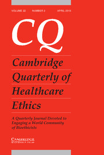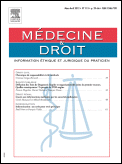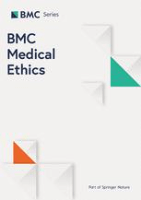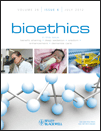
CAMBRIDGE QUARTERLY OF HEALTHCARE ETHICS
Scope & Guideline
Navigating the Ethical Landscape of Healthcare.
Introduction
Aims and Scopes
- Bioethics and Healthcare Policy:
The journal emphasizes the ethical implications of healthcare policies, exploring how regulations, laws, and ethical frameworks affect patient care and public health. - Patient Autonomy and Decision-Making:
A core area of exploration is the ethics surrounding patient autonomy, informed consent, and the complexities of decision-making in medical contexts, particularly concerning vulnerable populations. - Emerging Technologies and Ethics:
The journal addresses the ethical challenges posed by advancements in technology, such as artificial intelligence, neuroethics, and genetic engineering, focusing on their implications for patient rights and care. - Social Justice and Health Equity:
Central to the journal's mission is the analysis of ethical issues related to health disparities, justice in healthcare access, and the moral responsibilities of healthcare providers toward marginalized groups. - Research Ethics:
The journal investigates the ethical dimensions of medical research, including informed consent, the use of human subjects, and the responsibilities of researchers to ensure ethical practices.
Trending and Emerging
- AI and Ethics in Healthcare:
There is a notable increase in discussions surrounding the ethical implications of artificial intelligence in healthcare, emphasizing issues of accountability, transparency, and the impact of algorithms on patient care. - Mental Health and Ethical Considerations:
Emerging themes include the ethics of mental health treatment, particularly concerning autonomy and informed consent, reflecting a growing recognition of mental health as a critical area of bioethical inquiry. - Ethics of Pandemic Response:
The COVID-19 pandemic has catalyzed a surge in ethical discussions related to crisis management, resource allocation, and public health ethics, highlighting the need for robust ethical frameworks in emergency situations. - Vulnerable Populations and Ethics:
Increasing attention is being paid to the ethical concerns surrounding healthcare access and equity for vulnerable populations, including marginalized communities, indicating a trend towards social justice in healthcare ethics. - Neuroethics and Consciousness:
The journal is witnessing a rise in articles focused on neuroethics, particularly discussions around consciousness, cognitive enhancement, and the implications of brain research for moral status and rights.
Declining or Waning
- Traditional Ethical Frameworks:
There appears to be a waning focus on traditional ethical frameworks (e.g., principlism) in favor of more pragmatic and interdisciplinary approaches, indicating a shift towards more context-sensitive ethical analyses. - Historical Perspectives in Bioethics:
Papers that delve deeply into historical perspectives or philosophical traditions in bioethics are becoming less frequent, suggesting a movement towards contemporary and applied ethical discussions. - Conventional Views on Medical Professionalism:
The journal has seen fewer articles that strictly adhere to conventional views of medical professionalism, possibly as the discourse expands to include broader societal and systemic issues affecting healthcare.
Similar Journals

New Bioethics-A Multidisciplinary Journal of Biotechnology and the Body
Bridging the Gap Between Biotechnology and Ethical ResponsibilityNew Bioethics: A Multidisciplinary Journal of Biotechnology and the Body, published by Taylor & Francis Ltd, serves as a pivotal platform for scholarly discourse at the intersection of biotechnology, health policy, and bioethics. With an ISSN of 2050-2877 and E-ISSN 2050-2885, this journal has been contributing to the academic community since its establishment in 2012 and is set to continue through 2024. It holds notable rankings in prestigious fields, including Q4 in Genetics (clinical), Q3 in Health Policy, Q2 in Issues, Ethics and Legal Aspects, and Q3 in Reproductive Medicine as per 2023 quartile indicators. Although no open access model is available, the journal remains an essential resource for those interested in the ethical implications of biotechnological advancements. Its focus on the ethical, legal, and social dimensions of biotechnology is particularly relevant in today's rapidly evolving scientific landscape, making it invaluable for researchers, professionals, and students keen to explore the complexities surrounding the biotechnology and the human condition.

Journal of Bioethical Inquiry
Advancing Discourse on Bioethical ChallengesThe Journal of Bioethical Inquiry, published by Springer, is a prominent academic journal in the fields of bioethics, health policy, and social sciences. Established in 2004 and running through 2024, it is recognized for providing a critical platform for the exploration of ethical issues arising in the contexts of healthcare and policy making. With an ISSN of 1176-7529 and an E-ISSN of 1872-4353, this esteemed journal holds a Q2 quartile ranking in both Health Policy and Health (Social Science) categories, indicating its significant impact and contributions to the field. It boasts impressive Scopus rankings, with a standing of #70 out of 371 in Social Sciences _ Health (Social Science) and #68 out of 310 in Medicine _ Health Policy, representing its relevance and authority in these domains. Although it does not currently offer open access options, the Journal of Bioethical Inquiry remains a vital resource for researchers, practitioners, and students eager to engage with the complexities of bioethical challenges and to advance the discourse on health policies.

Ethik in der Medizin
Exploring Ethical Dimensions in HealthcareEthik in der Medizin, published by Springer, is a distinguished journal focusing on the interdisciplinary aspects of ethics in medicine, healthcare policy, and philosophical inquiries related to these domains. With an ISSN of 0935-7335 and an E-ISSN of 1437-1618, this journal serves as a platform for innovative research and discussion from Germany and beyond. The journal boasts an impact in several prestigious categories including Q3 in Health Policy and Q2 in Philosophy as of 2023, reflecting its significant contribution to the discourse on ethical implications in health and medicine. Although not currently Open Access, Ethik in der Medizin provides valuable insights for researchers, professionals, and students interested in the complexities of health ethics and policies, positioning itself as an essential resource in academia. The journal is undergoing important developments, as it converges from 2001 with a publishing timeline extending to 2024, ensuring continued relevance in a rapidly evolving field.

Acta Bioethica
Fostering Global Conversations on Bioethical ChallengesActa Bioethica is a pivotal open access journal published by the Universidad de Chile's Centro Interdisciplinario de Estudios Bioética, dedicated to the multidisciplinary exploration of bioethical issues in health policy and social sciences. Since its inception in 2000, the journal has fostered dialogue among researchers, professionals, and students, addressing the complexities of ethical practices in diverse health contexts. With an impressive commitment to accessibility, Acta Bioethica has become a vital resource for those engaged in understanding the ethics of healthcare in Latin America and beyond. Although currently ranked in the lower quartiles of Scopus in both health policy and social sciences, the journal is steadily gaining recognition for its unique contributions to bioethics. The journal accepts contributions in both English and Spanish, ensuring a wider reach and impact in the academic community. Located in Santiago, Chile, and active from 2007 to 2024, Acta Bioethica continues to be an essential platform for advancing research and discussions in the ever-evolving field of bioethics.

Cuadernos de Bioetica
Championing Ethical Practices in MedicineCuadernos de Bioetica, published by the ASOC ESPANOLA BIOETICA & ETICA MEDICA, is a prominent academic journal dedicated to exploring significant philosophical, ethical, and legal dimensions within the field of bioethics. With an ISSN of 1132-1989 and an E-ISSN of 2386-3773, this journal serves as a vital platform for researchers, professionals, and students in medicine and related disciplines. Since its inception in 2008, it has consistently provided critical analyses and discussions reflecting the evolving landscape of healthcare ethics, contributing notably to the discourse surrounding ethical practices in medicine. Despite its current Q4 ranking in the miscellaneous medicine category, Cuadernos de Bioetica is committed to enhancing its impact and relevance, making it an essential resource for those seeking to navigate the complex ethical challenges in contemporary medical practice. The journal’s reach is underscored by its commitment to fostering open dialogue among diverse stakeholders in the field, encouraging a broad spectrum of contributions to advance knowledge in bioethics.

Medecine & Droit
Advancing Knowledge at the Crossroads of Medicine and LawMedecine & Droit, an esteemed journal published by ELSEVIER MASSON, CORP OFF, serves as a vital resource for the intersection of law and medicine. Since its inception in 1995, this journal has facilitated scholarly discourse by publishing innovative research, case studies, and reviews that explore the complexities of legal frameworks impacting medical practice and public health. Although currently classified in the fourth quartile within both the Law and Medicine (miscellaneous) categories for 2023, its contributions are important for legal professionals and healthcare providers seeking to navigate the evolving landscape of medical laws. With an ISSN of 1246-7391 and E-ISSN 1873-6475, it provides essential insights and stimulates interdisciplinary collaboration within academia. Authors and researchers are encouraged to contribute and engage with critical topics shaping the future of medicine and law through this essential publication.

Medicine Health Care and Philosophy
Bridging Disciplines for a Healthier TomorrowMedicine Health Care and Philosophy, published by SPRINGER, is an esteemed journal that bridges the disciplines of health care, philosophy, and social science. With an ISSN of 1386-7423 and an E-ISSN of 1572-8633, this journal showcases interdisciplinary research that critically examines ethical, social, and philosophical issues in medicine and healthcare. With a significant impact factor and a status in the prestigious Q1 quartile for Philosophy and Q2 quartiles in both Education and Health Policy for the year 2023, it serves as a vital platform for scholars and practitioners to engage with the complex interplay of health and philosophy. The journal contributes to advancing knowledge and informing practice by publishing high-quality, peer-reviewed articles that promote scholarly dialogue across varied fields. As it converges towards 2024, Medicine Health Care and Philosophy remains dedicated to fostering a deeper understanding of health-related issues, making it an essential resource for researchers, professionals, and students committed to exploring the ethical dimensions of healthcare.

BMC Medical Ethics
Navigating the complexities of healthcare ethics.BMC Medical Ethics is a leading open-access journal dedicated to the critical exploration and dissemination of knowledge surrounding ethical issues in healthcare and medicine. Published by BMC, and headquartered in the United Kingdom, this journal has become a cornerstone in the field since its inception in 2000, with a remarkable focus on health policy, nursing ethics, and the complex legal aspects intertwining with healthcare practices. With an impressive Q1 ranking across multiple categories, including Health Policy and Health (Social Science), it ranks among the top journals globally—particularly notable with its Scopus rankings reflecting a strong 85th percentile in Nursing and an 81st percentile in Social Sciences. As an open-access publication, BMC Medical Ethics ensures that research findings are readily accessible, fostering a collaborative environment for researchers, practitioners, and students alike. The journal's commitment to ethical discourse not only advances academic inquiry but also shapes the practices and policies that govern healthcare delivery; thus, making it an invaluable resource for those engaged in the advancement of medical ethics.

BIOETHICS
Championing Innovative Research in Bioethics for a Better Tomorrow.BIOETHICS is a leading academic journal published by Wiley, dedicated to exploring the multifaceted issues at the intersection of healthcare, philosophy, and policy. With an ISSN of 0269-9702 and an E-ISSN of 1467-8519, it has established itself as a critical platform for scholarly discourse since its inception in 1987. The journal holds impressive rankings, featuring in the Q1 category in both Health (social science) and Philosophy, alongside a Q2 rating in Health Policy for 2023. This positions BIOETHICS in the top echelons of its fields, ranking 35th out of 806 in Philosophy and garnering high percentiles across relevant disciplines. By fostering a deeper understanding of ethical implications in medical and social contexts, BIOETHICS serves as an essential resource for researchers, professionals, and students committed to addressing contemporary challenges in health and policy. The journal is accessible through institutional subscriptions and offers an engaging platform for the dissemination of significant research findings and theoretical advancements, paving the way for future exploration in bioethical inquiry.

Christian Bioethics
Bridging Science and Faith in Bioethical DiscourseChristian Bioethics is a pivotal journal published by Oxford University Press, dedicated to the interdisciplinary exploration of bioethical issues from a Christian perspective. Since its inception in 1995, the journal has served as a crucial platform for scholars, practitioners, and students to engage with complex ethical questions at the intersection of medicine, philosophy, and religious studies. With an evolving scope that reflects contemporary debates in bioethics, the journal has achieved notable rankings, including Q2 in Religious Studies and Q3 in Philosophy in 2023, underscoring its significance in these fields. While not open access, Christian Bioethics continues to bridge gaps between faith and science, encouraging rigorous dialogue on how Christian ethics can inform bioethical decision-making and policy. It is essential reading for those looking to deepen their understanding of ethical issues shaped by religious convictions, making it an invaluable resource for researchers and professionals alike.